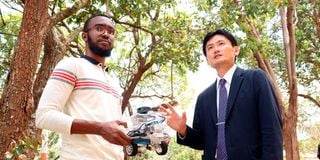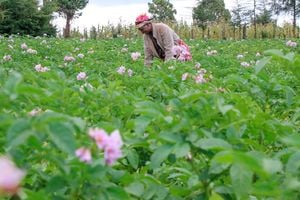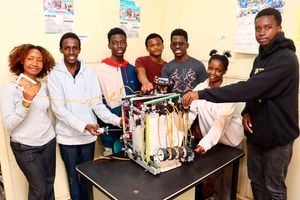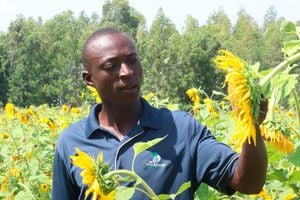
Mohammed Ibrahim (left) and Shohei Aoki during robotics competition at Jomo Kenyatta University of Agriculture and Technology in Juja on October 2, 2024.
As the world grapples with the effects of global warming, agriculture has to re-engineer its approaches for resilience. One strategy driving growth is technology. Precision agriculture is vital in this effort.
Integrated with artificial intelligence (AI), precision agriculture enhances monitoring, analysis and manages other practices more efficiently.
Data-driven decision-making helps farmers increase productivity, reduces costs and promotes sustainable practices.
Jomo Kenyatta University of Agriculture and Technology (JKUAT) and its partners have been developing self-operated machines for farming, including robots.
JKUAT students continue to showcase innovations through the Robotics Dojo training programme – part of the AFRICA-ai-JAPAN Project – designed to boost talent and advance robotics research.
Students from many institutions of higher learning took part in a contest at JKUAT featuring autonomous robots early last month.
The competition dwelt on using laser sensors for autonomous navigation.
According to Dr Shohei Aoki, the co-ordinator of the Robotic Dojo Programme, laser sensors for autonomous navigation can support precision farming and reduce post-harvest losses.

A robot during robotics competition at Jomo Kenyatta University of Agriculture and Technology in Juja on October 2, 2024.
“With these sensors, robots can now even map fields and determine the specific needs of different crops,” he says.
This allows farmers to optimise water, fertiliser and pesticide use, thereby reducing waste, improving yields and promoting sustainable agriculture.
“Robots equipped with autonomous navigation can act as seeders, thus plant accurately. This ensures uniform crop growth and reduces tasks,” he says.
Dr Aoki, a Japan International Cooperation Agency expert, has been assisting JKUAT develop research capacity in irrigation and robotics.
The Robotics Dojo competition was launched in 2022.
This year’s competition focused on autonomous robots using the simultaneous localisation and mapping technology.
The goal of the contest is to grow Kenya’s robotics research, with a focus on industries like agriculture and manufacturing. Dr Aoki says laser sensors for autonomous navigation can also be used in other sectors.
Every participating student or group had a budget of Sh20,000 to develop an experimental robot.

Emmanuel Nindo during robotics competition at Jomo Kenyatta University of Agriculture and Technology in Juja on October 2, 2024.
“In hospitality, robots with laser sensors can be used for room service and cleaning. Simple devices like vacuum cleaners can navigate spaces intelligently without human intervention. The advancement of autonomous navigation could improve efficiency and productivity, making everyday tasks easy and more efficient,” Dr Aoki says.
He adds that robots can help control pests, diseases and weeds.
“They can spray herbicides and pesticides with remarkable precision, targeting only the areas that need them. This reduces chemical use, cuts costs and preserves the environment,” he says.
“Robots are also being designed to harvest crops, identify ripe produce and pick it. This reduces the need for manual labour and speeds up harvesting.”
A total of 146 students have had training in robotics since the inception of the programme three years ago.
This year’s contest featured participants from JKUAT, Dedan Kimathi University of Technology, and the Pan-African University Institute for Basic Sciences, Technology and Innovation.
Mohamed Ibrahim, a fourth-year Electronics and Computer Engineering student at JKUAT, led his team’s robotics project to victory in the knowledge-sharing category of the competition.
“Such competitions encourage creative thinking and allow students to compare their skills with peers,” Ibrahim said.
Highlighting the importance of robotics in addressing challenges like labour shortages and resource inefficiency, Ibrahim added that technology like laser sensor can transform agriculture.
He plans to refine his robot’s sensors and algorithms, explore new applications and eventually commercialise his research for agricultural and industrial automation.
The contest challenges students to develop practical solutions to problems.
JKUAT aims to utilise robots for precision farming tasks like spraying, seeding and harvesting. The autonomous robots are assembled locally.







